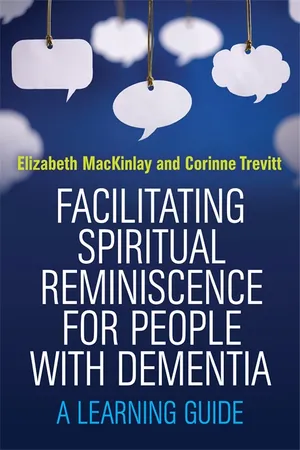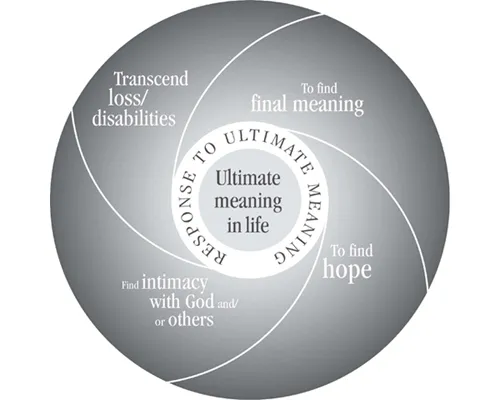![]()
Part 1
Learning about working with people who have dementia: Story, spirituality and spiritual reminiscence
![]()
Chapter 1
Spiritual care
In the day-to-day care of older people with dementia it is often easy to slip into the process of physical care at the expense of psychosocial, emotional and spiritual care. Indeed, in the midst of a busy day when there are staff shortages and older people with high level care needs, it is often the physical needs that receive priority and are taken care of first – any time left over can perhaps be devoted to other aspects of care. However, if we believe that each person deserves to be treated with dignity and care, then we need to provide holistic care. Holistic care means recognizing and addressing physical, social, psychological, emotional and spiritual needs of older people.
Spiritual needs are just as important as other needs, in fact one manager in aged care has said that about three quarters of her work involved matters of grief, guilt and fear. These are certainly issues of the spiritual dimension.
Spiritual needs are just as important as other needs.
Good person-centred care takes into account the spiritual as well as the emotional, psychosocial and physical needs of people. However, we have found in recent work with activities in residential aged care (Byrne and MacKinlay, 2012), that often, the basic practice of person-centred care, that we thought was well established, did not happen, especially when staff were adding new skills to their already established skills. Further, we have found that some staff still work from the premise that when a person’s cognitive status declines, communication should be restricted to factual and concrete examples, which is far from true. People with little cognitive function can and do respond positively to emotional and spiritual input. In fact they may respond to the spiritual and emotional when they are no longer able to respond cognitively. Our attitudes to people with failing cognitive abilities can have a real impact on either supporting or limiting interaction with people who have dementia. Spiritual and emotional care are closely associated with effective person-centred care. But, having said that, we need to look at what spirituality really is.
What is spirituality? Is it different from religion?
Describing the spiritual domain has always been difficult. Even now, when there seems to be a rising awareness of the spiritual in society there has been little agreement on what is the spiritual domain; if everyone has it, if it ought to be addressed, and if so by whom, and how.
However, it would be fair to say that spirituality is about meaning in life and relationship, and as such it is a critical part of what it is to be human (MacKinlay, 2012). Some people see religion and spirituality as being the same. Others say that there is no relationship between religion and spirituality. In this learning guide, it is maintained that religion and spirituality are connected, but that while some people do not practise a religion, all do have a spiritual dimension.
Spirituality is about meaning in life and is mediated through:
•relationship (with God and/or others)
•the arts
•the environment or creation and involves human creativity and imagination
•religion (religion takes in all aspects of spirituality).
(MacKinlay, 2012, p.16 )
When we talk about spirituality we are not referring to religiousness although of course, religion is part of spirituality for those who have a religious faith. Often spiritual care is not seen as a priority because the older person does not declare a religion or go to church. A better way to think about spirituality is to imagine that spirituality is an umbrella. Religion comes in under this umbrella and is one way to express this spirituality. Figure 1.1, based on MacKinlay 2006 (modified), helps to illustrate this concept.
There has recently been an increasing interest in studying the spiritual dimension. It is suggested (MacKinlay, 2001, 2006) that issues of a spiritual nature become more important as people age. Findings from a recent study of baby-boomer ageing show the importance of spirituality in later life (MacKinlay and Burns, unpublished study 2013), with spirituality associated with promoting mental and physical health and lower anxiety about ageing. It also found that baby boomers were not necessarily affiliated with religious organizations but had higher levels of spirituality.
There are many definitions of spirituality. The following definition arises from work undertaken by Elizabeth MacKinlay. She defines spirituality as:
That which lies at the core of each person’s being, an essential dimension which brings meaning to life. Constituted not only by religious practices, but understood more broadly, as relationship with God, however God or ultimate meaning is perceived by the person, and in relationship with other people. (MacKinlay, 2001, p.52)
Figure 1.1: Spirituality and religion (adapted from MacKinlay, 2006)
What is spiritual care?
Providing spiritual care is about tapping into the concept of spirituality – core meaning, deepest life-meaning and relationship. For some older people it may be expressed in a relationship with God or higher being, for others it could be expressed through nature, the environment and/or family and friends. It is what lies at the centre, the heart of our being and is from where we respond to all of life. Anger, hate, love, forgiveness and hope come from the heart.
Spiritual care in multi-cultural and multi-faith communities
Increasingly in western countries, care is being provided within a multi-cultural and multi-faith environment. Everyone associated with aged care needs first to be aware of their own spirituality and faith perspective, before they are able to meet the needs of others who may come from a different faith background. This ‘self-knowing’ is an important part of providing spiritual care.
If we recognize the spiritual dimension in ageing and want to really make a difference for older persons in need of care, the spiritual dimension must be recognized as a real dimension of holistic care.
Figure 1.2: A Model of Spiritual Tasks and Process of Ageing (MacKinlay, 2006, p.23)
This model (Figure 1.2) provides a framework for understanding spiritual processes in ageing. The model in this learning guide is a generic model based on people with and without a religious faith perspective. For a model of spiritual tasks and process of ageing for Christians, see MacKinlay, 2006; other models for major faith groups are being developed. The model used in this learning guide centres on the human search for meaning, and the associated responses to perceived meaning; the other tasks involve the development of transcendence (the ability to triumph over the psychosocial, physical and spiritual challenges of ageing) moving from provisional to final life-meanings, finding intimacy and finding hope. In the context of spiritual reminiscence it has a focus on story and finding meaning through the story. This model allows for continued spiritual growth and development until the end of life. It also suggests opportunities for spiritual assessment and intervention (a spiritual assessment form can be found in MacKinlay, 2006, pp.246–252).
The Model of Spiritual Tasks and Process of Ageing
First, a word of explanation about the model. A model can be helpful in understanding what is happening in a situation. It can enhance our ability to see patterns and identify opportunities for change and interventions where these are needed.
The word ‘task’ is used in this context to explain the potential spiritual changes that can take place, most often in the later years of life. We have added the term ‘process’ to the model, as when Elizabeth first developed the model of spiritual tasks (MacKinlay, 2001), some thought that it was simply tasks to be done, ticked off, and completed. However, the model is not only about individual and isolated tasks, but a process that can potentially last until the end of life, with spiritual growth and development continuing unless blocked in some way.
At least some of the spiritual tasks and processes of ageing are related to physical and mental changes that occur in later life. These changes involve losses frequently encountered in ageing such as, loss of rel...


